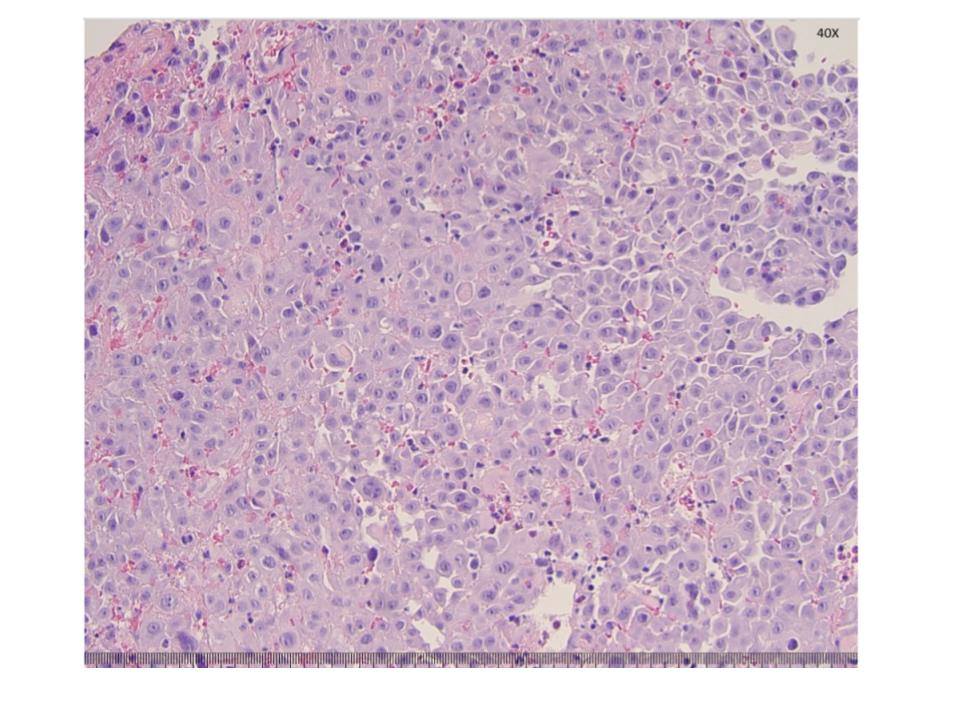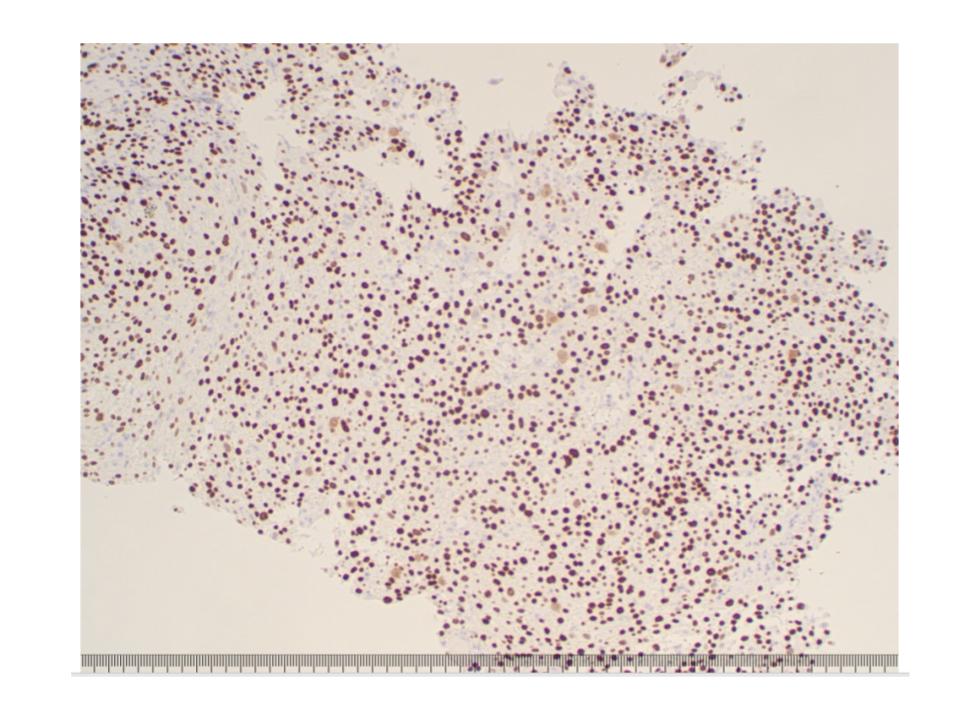Sunday Poster Session
Category: Stomach and Spleen
P2097 - Early Stage Gastric Squamous Cell Carcinoma in a Patient With Lynch Syndrome
Sunday, October 26, 2025
3:30 PM - 7:00 PM PDT
Location: Exhibit Hall

Bianca Thakkar, DO
University of Connecticut Health
Farmington, CT
Presenting Author(s)
Aaron Kiel, BSc1, Shriya Bavishi, MBBS1, Bianca Thakkar, DO2, Stefan Thorarensen, MD, MPH1, Purabi Dhakras, MD3, Carol Petruff, MD3
1University of Connecticut School of Medicine, Farmington, CT; 2University of Connecticut Health, Farmington, CT; 3Saint Francis Hospital, Trinity Health of New England, Hartford, CT
Introduction: Squamous cell carcinoma (SCC) of the stomach is a gastroenterological malignancy that is exceedingly rare, accounting for approximately 0.04% to 0.2% of all gastric malignancies, and having only been documented less than 100 times in case reports to date. Being so rare, the pathogenesis of primary gastric SCC remains unclear. Due to its aggressive nature, it is also often diagnosed at a late stage, attributing to it a poor prognosis.
Case Description/
Methods: A 63 year old female with prior medical history of Lynch syndrome, colon cancer at age 27 status post resection, recent TBI, and diabetes type 1 presented to the emergency department with hypoglycemia and fatigue that acutely worsened after undergoing bowel prep for outpatient EGD and colonoscopy. The patient had previously undergone MRI abdomen as part of workup for intractable lower abdominal pain associated with bloating and dyspepsia. The MRI revealed gastric wall thickening concerning for malignancy. The patient was stabilized and underwent EGD during admission that revealed an ulcerated mass in the gastric antrum covering three fourths of the pylorus without obstruction. Biopsy of the mass sent to pathology revealed SCC. The patient then underwent a follow-up PET scan due to strong suspicion for metastasis. PET scan revealed no other sites of malignancy or affected lymph nodes, suggesting primary stomach SCC. An oncology consultation recommended immunotherapy, but the family decided to pursue palliative care given her acute decline in the setting of recent TBI. The patient was discharged on home hospice.
Discussion: The case of a 63-year-old female with Lynch syndrome presenting with primary gastric SCC is highly unusual. Lynch syndrome is predominantly associated with adenocarcinomas, of which one is gastric adenocarcinoma, rather than SCC. The occurrence of SCC in this context raises questions as to whether this was related to her Lynch diagnosis or just occurred by random chance. This patient’s diagnosis of SCC of the stomach at a localized stage is particularly notable considering its typically poor prognosis. In a patient that was not already experiencing acute decline related to TBI, this would likely have been an opportunity to intervene surgically. This case highlights the importance of vigilance for atypical malignancies in patients with Lynch syndrome. Due to the rarity of this cancer, more case reports are needed to determine the best course of action in patient’s presenting with gastric SCC, particularly at an early stage.

Figure: Hematoxylin and eosin stain of the patient's gastric antral mass viewed at 40x magnification revealed sheets of tumor cells with abundant eosinophilic cytoplasm and prominent nucleoli, consistent with a malignant neoplasm.

Figure: Subsequent P40 immunostaining of the patient's gastric antral mass biopsy viewed at 40x magnification revealed strong nuclear expression of P40, supporting squamous cell differentiation.
Disclosures:
Aaron Kiel indicated no relevant financial relationships.
Shriya Bavishi indicated no relevant financial relationships.
Bianca Thakkar indicated no relevant financial relationships.
Stefan Thorarensen indicated no relevant financial relationships.
Purabi Dhakras indicated no relevant financial relationships.
Carol Petruff indicated no relevant financial relationships.
Aaron Kiel, BSc1, Shriya Bavishi, MBBS1, Bianca Thakkar, DO2, Stefan Thorarensen, MD, MPH1, Purabi Dhakras, MD3, Carol Petruff, MD3. P2097 - Early Stage Gastric Squamous Cell Carcinoma in a Patient With Lynch Syndrome, ACG 2025 Annual Scientific Meeting Abstracts. Phoenix, AZ: American College of Gastroenterology.
1University of Connecticut School of Medicine, Farmington, CT; 2University of Connecticut Health, Farmington, CT; 3Saint Francis Hospital, Trinity Health of New England, Hartford, CT
Introduction: Squamous cell carcinoma (SCC) of the stomach is a gastroenterological malignancy that is exceedingly rare, accounting for approximately 0.04% to 0.2% of all gastric malignancies, and having only been documented less than 100 times in case reports to date. Being so rare, the pathogenesis of primary gastric SCC remains unclear. Due to its aggressive nature, it is also often diagnosed at a late stage, attributing to it a poor prognosis.
Case Description/
Methods: A 63 year old female with prior medical history of Lynch syndrome, colon cancer at age 27 status post resection, recent TBI, and diabetes type 1 presented to the emergency department with hypoglycemia and fatigue that acutely worsened after undergoing bowel prep for outpatient EGD and colonoscopy. The patient had previously undergone MRI abdomen as part of workup for intractable lower abdominal pain associated with bloating and dyspepsia. The MRI revealed gastric wall thickening concerning for malignancy. The patient was stabilized and underwent EGD during admission that revealed an ulcerated mass in the gastric antrum covering three fourths of the pylorus without obstruction. Biopsy of the mass sent to pathology revealed SCC. The patient then underwent a follow-up PET scan due to strong suspicion for metastasis. PET scan revealed no other sites of malignancy or affected lymph nodes, suggesting primary stomach SCC. An oncology consultation recommended immunotherapy, but the family decided to pursue palliative care given her acute decline in the setting of recent TBI. The patient was discharged on home hospice.
Discussion: The case of a 63-year-old female with Lynch syndrome presenting with primary gastric SCC is highly unusual. Lynch syndrome is predominantly associated with adenocarcinomas, of which one is gastric adenocarcinoma, rather than SCC. The occurrence of SCC in this context raises questions as to whether this was related to her Lynch diagnosis or just occurred by random chance. This patient’s diagnosis of SCC of the stomach at a localized stage is particularly notable considering its typically poor prognosis. In a patient that was not already experiencing acute decline related to TBI, this would likely have been an opportunity to intervene surgically. This case highlights the importance of vigilance for atypical malignancies in patients with Lynch syndrome. Due to the rarity of this cancer, more case reports are needed to determine the best course of action in patient’s presenting with gastric SCC, particularly at an early stage.

Figure: Hematoxylin and eosin stain of the patient's gastric antral mass viewed at 40x magnification revealed sheets of tumor cells with abundant eosinophilic cytoplasm and prominent nucleoli, consistent with a malignant neoplasm.

Figure: Subsequent P40 immunostaining of the patient's gastric antral mass biopsy viewed at 40x magnification revealed strong nuclear expression of P40, supporting squamous cell differentiation.
Disclosures:
Aaron Kiel indicated no relevant financial relationships.
Shriya Bavishi indicated no relevant financial relationships.
Bianca Thakkar indicated no relevant financial relationships.
Stefan Thorarensen indicated no relevant financial relationships.
Purabi Dhakras indicated no relevant financial relationships.
Carol Petruff indicated no relevant financial relationships.
Aaron Kiel, BSc1, Shriya Bavishi, MBBS1, Bianca Thakkar, DO2, Stefan Thorarensen, MD, MPH1, Purabi Dhakras, MD3, Carol Petruff, MD3. P2097 - Early Stage Gastric Squamous Cell Carcinoma in a Patient With Lynch Syndrome, ACG 2025 Annual Scientific Meeting Abstracts. Phoenix, AZ: American College of Gastroenterology.
